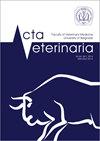Fowl Adenovirus Infection – Potential Cause of a Suppressed Humoral Immune Response of Broilers to Newcastle Disease Vaccination
IF 0.8
4区 农林科学
Q3 VETERINARY SCIENCES
引用次数: 0
Abstract
Abstract Fowl adenovirus infections have a significant economic impact, especially in the production of broilers. It is considered the leading cause of three syndromes: adenoviral gizzard erosions and ulcerations, inclusion body hepatitis, and hepatitis-hydropericardium syndrome. A critical feature of this virus is its immunosuppressive effect, via suppressing humoral and cellular immunity. In this study, we examined the humoral immune response after administration of the Newcastle disease vaccine in broiler flocks with previously confirmed seroconversion against Fowl adenovirus. The study was conducted on 5 farms. A total of 220 chickens, five weeks of age, showing no clinical signs of the disease, were included in this study. The control group consisted of 20 chickens from a negative farm. Chickens were vaccinated with commercially available live NDV vaccines between 11 and 13 days of life. ELISA determined the presence of specific antibodies against FAdV in a total of 130/200 (65%) blood sera. Depending on the farm, seroprevalence ranged from 30-100%. The presence of specific antibodies against NDV was determined three weeks after vaccination using the hemagglutination inhibition assay. A positive hemagglutination inhibition (HI) titer (≥ 16) was found in 41/200 (20.5%) sera, which was significantly less compared to the control farm, where a positive HI titer was found in 20/20 (100%) sera. The results of our study indicate the immunosuppressive effect of FAdV in subclinically infected birds and highlight the need for its diagnosis, prevention, and control.家禽腺病毒感染——肉鸡对新城疫疫苗体液免疫反应抑制的潜在原因
摘要家禽腺病毒感染对经济有重大影响,特别是在肉鸡生产中。它被认为是引起三种综合征的主要原因:腺病毒性砂眼糜烂和溃疡、包涵体肝炎和肝炎心包积液综合征。这种病毒的一个关键特征是通过抑制体液和细胞免疫产生免疫抑制作用。在这项研究中,我们检测了在肉鸡群中接种新城疫疫苗后的体液免疫反应,该肉鸡群先前已证实对家禽腺病毒的血清转化。这项研究在5个农场进行。本研究共包括220只五周龄的鸡,它们没有表现出疾病的临床症状。对照组由20只来自阴性养殖场的鸡组成。鸡在出生后11至13天内接种了市售的新冠病毒活疫苗。ELISA测定了总共130/200(65%)份血清中抗FAdV的特异性抗体的存在。根据农场的不同,血清流行率在30-100%之间。使用血凝抑制测定法在接种疫苗三周后测定抗NDV的特异性抗体的存在。在41/200(20.5%)血清中发现阳性血凝抑制(HI)滴度(≥16),与对照农场相比显著降低,对照农场在20/20(100%)血清中找到阳性HI滴度。我们的研究结果表明,FAdV对亚临床感染的鸟类具有免疫抑制作用,并强调了对其诊断、预防和控制的必要性。
本文章由计算机程序翻译,如有差异,请以英文原文为准。
求助全文
约1分钟内获得全文
求助全文
来源期刊

Acta Veterinaria-Beograd
农林科学-兽医学
CiteScore
1.30
自引率
16.70%
发文量
33
审稿时长
18-36 weeks
期刊介绍:
The Acta Veterinaria is an open access, peer-reviewed scientific journal of the Faculty of Veterinary Medicine, University of Belgrade, Serbia, dedicated to the publication of original research articles, invited review articles, and to limited extent methodology articles and case reports. The journal considers articles on all aspects of veterinary science and medicine, including the diagnosis, prevention and treatment of medical conditions of domestic, companion, farm and wild animals, as well as the biomedical processes that underlie their health.
 求助内容:
求助内容: 应助结果提醒方式:
应助结果提醒方式:


